Victims of sexual abuse in confinement deserve advocacy and treatment services comparable to those available to victims outside of confinement. Several Prison Rape Elimination Act (PREA) standards set requirements for the level of victim services that correctional agencies are responsible for providing or coordinating, including:
- Access to victim advocates for forensic medical exams and outside confidential support services (115.21, 115.121, 115.221, 115.321; 115.53, 115.253, 115.353);
- Coordinated response planning (115.65, 115.165, 115.265, 115.365); and
- Emergency medical services (115.82, 115.182, 115.282, 115.382) and ongoing mental health care for victims (115.83, 115.283, 115.383).
Establishing partnerships with community-based service providers is the optimal way to meet these requirements and ensure that victims’ needs are met. Depending of the structure and location of the correctional agency, partners can include state, county, or local organizations. Agencies can seek new partners to work with or consider how to strengthen or expand existing relationships with community-based service providers.
In a recent two-part webinar series (Part I and Part II), the Vera Institute of Justice (Vera) and Just Detention International (JDI) profiled four agencies’ emerging partnerships with outside organizations and their efforts to implement key components of the above-mentioned PREA standards. The sections that follow highlight how these different agencies—a state prison system, two county jails, and a juvenile services agency—are approaching victim services and working with community partners to deliver critical services to victims in confinement.
Partnering at the State Level: Getting to Know Each Other
Overview of the Washington State Department of Corrections and Community Partners:
 The Washington State Department of Corrections (DOC) manages 12 prisons and 16 work centers across the state, with an average daily population of 17,550. DOC also supervises approximately 15,450 offenders on active community supervision. In the spring of 2013, DOC partnered with the Washington State Office of Crime Victims Advocacy (OCVA) and the Washington Coalition of Sexual Assault Programs (WCSAP) to develop a statewide service delivery system for victims of sexual abuse in state prisons.
The Washington State Department of Corrections (DOC) manages 12 prisons and 16 work centers across the state, with an average daily population of 17,550. DOC also supervises approximately 15,450 offenders on active community supervision. In the spring of 2013, DOC partnered with the Washington State Office of Crime Victims Advocacy (OCVA) and the Washington Coalition of Sexual Assault Programs (WCSAP) to develop a statewide service delivery system for victims of sexual abuse in state prisons.
- OCVA is a state government agency that advocates for victims of crime, administers grants to local community programs, provides technical assistance to community-based victims programs, and advises local and state government in matters relating to crime victims.
- WCSAP is a nonprofit organization that provides information, training, and technical assistance to programs and individuals that support survivors of sexual abuse. WCSAP also conducts related public policy research and produces publications.
Coming Together
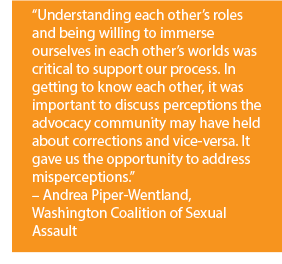 As part of her efforts to help DOC come into compliance with the PREA standards, PREA Coordinator Beth Schubach reached out to OCVA for help with providing inmate access to outside confidential support services (See §115.53). DOC and OCVA had worked together in the past on other initiatives, and following some preliminary discussions and brainstorming sessions, they forged a new partnership to deliver quality services to inmates who are victims of sexual abuse. Along with WCSAP, which works closely with OCVA to support sexual abuse survivor services through rape crisis centers across the state, the three agencies met regularly to gain an understanding of each other’s roles and functions and to begin designing a package of services that would meet victims’ needs and assist DOC in becoming PREA compliant. These weekly meetings helped each agency to do the following.
As part of her efforts to help DOC come into compliance with the PREA standards, PREA Coordinator Beth Schubach reached out to OCVA for help with providing inmate access to outside confidential support services (See §115.53). DOC and OCVA had worked together in the past on other initiatives, and following some preliminary discussions and brainstorming sessions, they forged a new partnership to deliver quality services to inmates who are victims of sexual abuse. Along with WCSAP, which works closely with OCVA to support sexual abuse survivor services through rape crisis centers across the state, the three agencies met regularly to gain an understanding of each other’s roles and functions and to begin designing a package of services that would meet victims’ needs and assist DOC in becoming PREA compliant. These weekly meetings helped each agency to do the following.
- Learn about each other’s operations. For example, OCVA and WCSAP staff toured DOC facilities and had an opportunity to ask staff questions.
- Gain fluency in each other’s language and culture. Agencies shared acronyms and discussed interpretations of key concepts such as confidentiality and safety.
- Openly address assumptions. Agencies engaged in honest conversations about their perceptions of each other’s roles—victim advocate, DOC administrator, etc.—and philosophical frameworks.
- Anticipate potential obstacles. For instance, the workgroup discussed challenges victim advocates might face in maintaining clients’ confidentiality when providing services within a prison.
This period enabled the workgroup to identify each agency’s strengths and capacities, goals, potential barriers, and available resources. It established a crucial foundation from which to plan next steps.
Designing Services and Crafting an Implementation Plan
By analyzing available statewide data, reviewing existing victim services in the community, and conducting surveys regarding the PREA readiness of community organizations, DOC, OCVA, and WCSAP crafted an implementation plan for a statewide victim service delivery system that can be broken down and duplicated at the facility level. Keeping the immediate needs of victims of sexual abuse in mind, the workgroup identified the following priorities.
- Crisis intervention
- Forensic medical exams
- Ongoing support services
In 2014, the agencies will be phasing in crisis intervention and hospital accompaniment for forensic medical exams. Once those core services are in place, they will work on delivering ongoing support services in facilities.
Phase 1- Crisis Intervention: A Hotline for Victims.
In January 2014, DOC, OCVA, and WCSAP are planning to roll out a confidential, centralized hotline for inmates who have been sexually abused. All state DOC inmates will have access to this line, and calls will be directed to a central hub, operated by OCVA. The hotline will connect inmates with advocates who can immediately assess their needs, and the state advocate eventually will be able to link callers with local agencies that can provide further support. Calls will not be recorded to ensure victim privacy and confidentiality, in accordance with state and federal law (See §115.21).
Phase 2- Forensic Medical Exams: Hospital Accompaniment.
For Phase 2 of their service implementation plan, the workgroup is creating a step-by-step process to enable advocates from local rape crisis centers to accompany victims from DOC through the forensic medical exam process. Forensic medical exams for inmates take place in community area hospitals, and the agencies are currently working through the logistics of providing hospital accompaniment and details such as how exam rooms should be laid out for inmate exams and DOC transport procedures.
Phase 3- Ongoing Support Services: In-Facility Treatment.
A third, longer-term goal for DOC and its partners is to provide onsite follow-up care and legal advocacy to victims at facilities. Right now, the agencies are focused on the core services of crisis intervention and hospital accompaniment but hope to develop a plan for providing ongoing support services at facilities in the next fiscal year.
Poised for Success
DOC, OCVA, and WCSAP have devoted significant time and energy to understanding each other, staying focused on a clear mission and set of goals, and designing services that will meet the needs of victims in DOC facilities. Throughout the planning process, whenever they felt overwhelmed by details or faced setbacks, they reminded each other of the end goal of providing victim-centered care to inmates, which helped refocus their discussions and move the process forward. PREA Coordinator Beth Schubach said, “The lynchpin to the success of this work has been the philosophical framework that all partners are working towards the same goal of eliminating sexual abuse.”
Partnering at the County Level: Sexual Assault Response Teams and Memoranda of Understanding
Barnwell County Detention Center and Bexar County Jail
I. Implementing a Sexual Assault Response Team: Barnwell County Detention Center, South Carolina
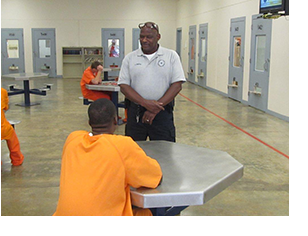 The Barnwell County Detention Center (BCDC) is a small, rural jail located in South Carolina. It has a capacity of 106 and an average population of 75 inmates. It employs 32 staff members, and the average length of stay is two weeks. As in Washington State, Jail Administrator Deloris Charlton initially reached out to the Cumbee Center to Assist Abused Persons (Cumbee) for help with establishing access to outside confidential support services (See §115.53).
The Barnwell County Detention Center (BCDC) is a small, rural jail located in South Carolina. It has a capacity of 106 and an average population of 75 inmates. It employs 32 staff members, and the average length of stay is two weeks. As in Washington State, Jail Administrator Deloris Charlton initially reached out to the Cumbee Center to Assist Abused Persons (Cumbee) for help with establishing access to outside confidential support services (See §115.53).
- Cumbee is a nonprofit agency that provides rape crisis services to abused women, their children, teenagers, and men throughout South Carolina. Cumbee has been providing services for various local jails around the state for some time.
In Jail Administrator Charlton’s research into community-based resources that could help address sexual abuse, she discovered that Barnwell County did not have a county sexual assault response team (SART). Acting on advice from a Cumbee advocate, she reached out to the South Carolina Victim Assistance Network to learn more about SARTs.
- The South Carolina Victim Assistance Network (SCVAN) provides emergency funds, legal services, and referrals to medical, mental health, and criminal justice services to victims of crime, including survivors of sexual assault. SCVAN also provides technical assistance to victim service providers. The agency assists in SART development throughout South Carolina.
Getting to Know Local Advocates and Designing Services
Understanding Confidentiality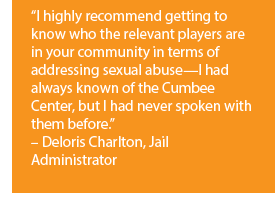
When the jail administrator initially reached out to Cumbee, she asked if, in addition to providing victim services, they could also manage a sexual abuse reporting hotline for inmates. Upon further exploration, both agencies decided that Cumbee would be better suited to providing counseling and emotional support services to BCDC inmates who have been abused. Both agencies had concerns about confidentiality and conflicts of interest, as rape crisis centers’ primary mandate is to provide confidential counseling and support. The agencies agreed that a different agency, such as a police department, would be better suited to receive reports of abuse from inmates and report them back to the jail, as per the inmate reporting requirement (See §155.51).
Crisis Intervention and Hospital Accompaniment
Instead of a reporting hotline, the agencies turned their attention to crisis intervention services and hospital accompaniment. Cumbee has agreed to offer emotional support services via a confidential hotline to any BCDC inmate who has been sexually abused at any point in his/her life. Cumbee rape crisis advocates also will be available to accompany victims who are transported to the local hospital for emergency medical services in the aftermath of sexual abuse. The two agencies entered into a memorandum of understanding (MOU) for these services (provided in “Resources” below). More details about developing an MOU appear in the Bexar County Jail section below.
Developing a County SART
As mentioned earlier, while researching community-based sexual abuse resources in Barnwell County, Jail Administrator Charlton learned that the county did not have a SART. Although not specifically mandated in the PREA standards, SARTs are accepted best practices for responding to sexual abuse, both in communities and in detention facilities. A SART is a multidisciplinary team that typically includes rape crisis advocates, sexual assault nurse examiners (SANEs), law enforcement officers, and prosecutors. SARTs that service confinement facilities also should include facility administrators, PREA coordinators, medical and mental health staff, internal investigators, and anyone else who might be involved in responding to sexual abuse.
Recognizing that the jail could benefit from the expertise of a county SART, BCDC sought to form a coalition to develop a SART to service all Barnwell County residents—inmates and community members alike. Acting on the advice of Cumbee advocates, the jail administrator contacted the SCVAN, which helps counties in South Carolina develop SARTs. Together, BCDC and SCVAN convened a planning meeting to discuss developing a county SART. Attendees included staff from BCDC, Cumbee, SCVAN, and other community organizations such as the South Carolina Coalition Against Domestic Violence and Sexual Assault. An investigator from the Barnwell County Sheriff’s Office also attended. Future meetings will include a representative from the Barnwell County Hospital, where inmates will be taken to undergo forensic medical exams, and representatives from the Sheriff’s Office of Victim Advocacy and the Barnwell County Prosecutor’s Office.
As of the fall of 2013, county stakeholders have decided to create one SART that will serve both incarcerated and non-incarcerated victims of sexual abuse. This will ensure that the special needs and circumstances of incarcerated victims are integrated into the SART framework from the outset. It also should be more efficient, as service providers will participate in a single planning period and meeting schedule rather than two.
Poised for Success
BCDC is a small rural jail that has been extremely proactive and thoughtful in seeking out community service providers and strategies for delivering victim services to jail inmates. Its work setting up crisis intervention and hospital accompaniment services with Cumbee demonstrates how even the smallest of agencies can comply with the PREA standards and deliver meaningful services to victims of sexual abuse in confinement. Further, while still in the preliminary stages of bringing core responders together and establishing roles and responsibilities, BCDC, in partnership with SCVAN, has helped spur an SART process that will not only help the jail with PREA standards implementation, but also will provide an invaluable resource for all victims of sexual abuse in Barnwell County, whether in the community or in detention.
II. Developing an MOU: Bexar County Adult Detention Center, Texas
 Overview of the Bexar County Adult Detention Center and the Rape Crisis Center of San Antonio
Overview of the Bexar County Adult Detention Center and the Rape Crisis Center of San Antonio
The Bexar County Adult Detention Center (Bexar County Jail) is a large jail located in San Antonio, Texas. The jail has a capacity of 4,600 inmates and an average population of 3,500. It is coed, houses inmates as young as 17 years of age, and has an average length of stay of 30 days. The jail serves the greater San Antonio area.
As in the previous examples, Bexar County PREA Coordinator Monica Lugo reached out to advocates at the Rape Crisis Center of San Antonio for help with establishing inmate access to outside confidential support services (See §115.53).
- The Rape Crisis Center of San Antonio (RCC) is one of the largest rape crisis centers in Texas, serving a population of approximately 1.7 million. RCC operates a 24-hour crisis intervention hotline, provides counseling and hospital accompaniment services, and conducts outreach and education programs in the community.
Getting to Know Local Advocates and Designing Services
Crisis Intervention and Hospital Accompaniment
Similar to the Washington DOC and BCDC, Ms. Lugo conducted initial outreach to local advocates at RCC to explore working together to provide victim services to jail inmates. Ms. Lugo said, “A critical first step in our work together was that we had in-person meetings among leadership from the county [including the jail] and rape crisis center about what a collaboration would mean for each entity culturally, to make sure that everyone was aware of initial challenges they might face, and to make sure they understand how this work all ties in with PREA.” RCC was experienced in providing hospital advocacy to victimized inmates from area facilities and open to formalizing a partnership with the Bexar County Jail to develop a crisis intervention hotline and hospital accompaniment program. RCC also has agreed to provide an advocate during investigator interviews at the victim’s request and will present this option to victimized inmates during the forensic examination process. These services and the roles and responsibilities of each agency are detailed in a two-page MOU that both agencies have signed (provided in Resources below).
Developing an MOU
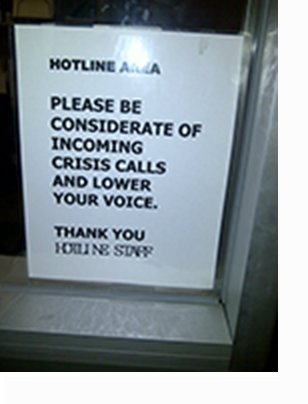 An MOU is an agreement between two or more agencies that spells out the roles and responsibilities of each agency in carrying out a service or package of services. MOUs are extremely helpful tools for agencies to use as they develop partnerships to provide victim services in confinement settings. In Bexar County, the jail and RCC worked together to develop an MOU that lists the duties that each agency agrees to fulfill regarding the confidential hotline, hospital accompaniment and support during investigatory interviews, and training and education. For example, in the MOU, the jail agrees to make RCC involvement by phone part of its response, and RCC agrees to staff the hotline.
An MOU is an agreement between two or more agencies that spells out the roles and responsibilities of each agency in carrying out a service or package of services. MOUs are extremely helpful tools for agencies to use as they develop partnerships to provide victim services in confinement settings. In Bexar County, the jail and RCC worked together to develop an MOU that lists the duties that each agency agrees to fulfill regarding the confidential hotline, hospital accompaniment and support during investigatory interviews, and training and education. For example, in the MOU, the jail agrees to make RCC involvement by phone part of its response, and RCC agrees to staff the hotline.
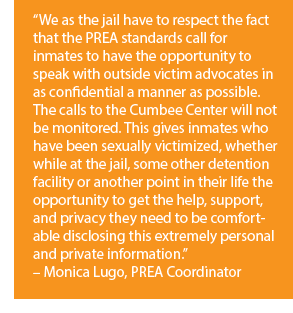
To avoid any confusion, the MOU clearly states that the hotline is for confidential crisis counseling and not for officially reporting sexual abuse. It specifies that RCC advocates will only contact mental health staff at the jail to report emergency safety concerns, and when doing so, will not disclose any information beyond the immediate concern
In the MOU, RCC also agrees to provide advocates for hospital accompaniment and support during investigatory interviews when requested.
Finally, both parties have agreed in the MOU to training and education efforts. The jail has agreed to educate inmates about RCC’s services and to provide information to RCC on its sexual abuse response protocols. RCC has agreed to attend trainings on institutional policies and procedures to maintain safety and security. In their work together so far, the two agencies have found cross-training activities extremely helpful for understanding each other’s culture and circumstances.
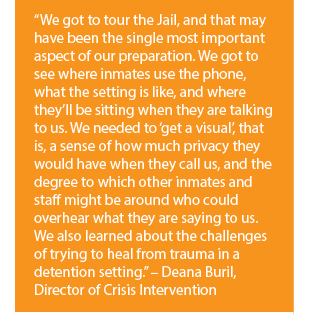 Poised for Success
Poised for Success
The MOU between the Bexar County Jail and RCC was recently approved after undergoing a review by county officials and RCC. The process of designing the services and developing the MOU took about five months, and during this time, representatives from both agencies worked through a number of difficult issues and learned about each other’s services and operations. As they prepare for the services to go live, they have built a solid foundation and formalized an agreement that will help them meet the needs of sexual abuse victims at the jail.
Expanding Existing Partnerships
Administration for Children’s Services, New York City
Overview of Administration for Children’s Services
New York City’s Administration for Children’s Services (ACS) is the city’s child welfare and juvenile justice agency. It serves all five boroughs of New York City and operates both secure and nonsecure facilities. ACS works with between 40 and 50 community-based organizations to bring programming into its two secure and 15 nonsecure facilities.
Expanding Existing Partnerships
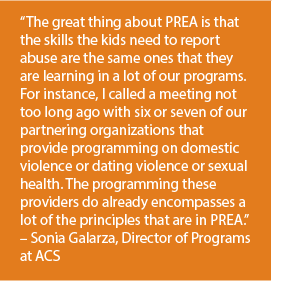 In Part II of the webinar on establishing partnerships with community service providers, JDI spoke with ACS Director of Programs Sonia Galarza about how agencies can build on existing relationships with community service providers to augment their overall PREA program. Beyond the crisis intervention and hospital advocacy services described in the previous examples, some agencies like ACS are working with their community partners to weave PREA information into existing programs. For example, to address PREA education requirements (See § 115.333), Ms. Galarza and ACS’s community partners that deliver educational programming have been exploring ways to incorporate information about sexual safety in detention into their curricula.
In Part II of the webinar on establishing partnerships with community service providers, JDI spoke with ACS Director of Programs Sonia Galarza about how agencies can build on existing relationships with community service providers to augment their overall PREA program. Beyond the crisis intervention and hospital advocacy services described in the previous examples, some agencies like ACS are working with their community partners to weave PREA information into existing programs. For example, to address PREA education requirements (See § 115.333), Ms. Galarza and ACS’s community partners that deliver educational programming have been exploring ways to incorporate information about sexual safety in detention into their curricula.
ACS is in the early stages of this work but is excited to work with its partners to create a consistent message for youth about their right to be free from sexual abuse, whether in ACS’s custody or out in the community
Resources